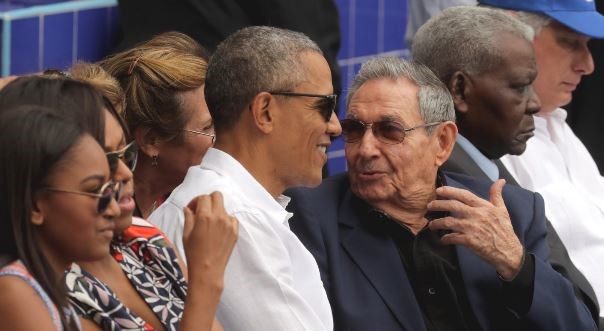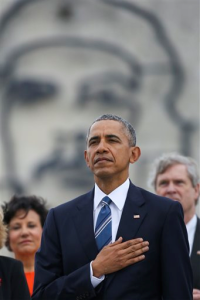
An assessment of Barack Obama’s visit
HAVANA — Barack Obama’s visit to Cuba has just ended. The president had an opportunity to address the Cuban people broadly, to display his charm and draw the attention of the international media, taking advantage of the event’s historical significance.
Desirous not to give the impression that the visit was “a honeymoon” with the U.S. president, Cuba’s official treatment was respectful but distant. However, the population expressed itself in a warmer manner, especially when Obama strolled through the streets of Havana and imposed his undeniable charisma.
It is not surprising that Obama awakened the sympathy of the Cuban people. It has happened everywhere else in the world, ever since he assumed his post. The reasons are not only attributable to his personality; the content of his ideas is also important.
I believe that he is the most intelligent and articulate president the U.S. has had since Kennedy.

Also influential is the natural identification of the majority of Cubans with his social origin — something that Obama knows how to exploit to stand as an example of “the American dream” — and his race symbolizes a transcendental change in the social history of the United States, a process with which many people empathize.
Besides, he has been a good president, within the conditions imposed upon him by his country’s politics. If no other merits are recognized it’s because of the political polarization that exists and the racism that rules in that society.
Beyond his undeniable personal gifts, the key to his popularity is that Obama shows up selling us “another United States.” In a way it is, especially if we compare it with the eight years of neoconservative rule that preceded it, where George W. Bush’s message could be summarized by the phrase “you’re either with me or against me,” and if you are against me, the cavalry is right behind me.
It remains to be seen if this legacy holds for the immediate future, whoever the next U.S. president turns out to be.
It is difficult to oppose the idealism that Obama conveyed in various moments during his visit to Cuba. However, seen realistically, his image of the United States doesn’t match the actual practice. Not only in historical terms — a history from which Obama always wants to be separated — but also in actuality.
Obama’s own failure in propelling an agenda that solidifies those social objectives in the domestic scene is a palpable example of this and explains the frustration of many of his own voters throughout his mandate.
If we want to analyze this from the point of view of foreign policy, we have examples to spare. Limiting ourselves to the most recent developments, we need only to look at his visit to Argentina and his praises of Mauricio Macri (whom he described as a model of Latin American governance) to understand the contradiction between his social discourse and his alliance with the most stale right wing in the continent, an alliance guided by the interests of the U.S., regardless of the personal criteria of the current president of Argentina.

Although some in Cuba describe Obama as a “snake charmer,” I don’t believe that he came to the island to deceive us Cubans. I think he really believes the values he advocates, although the need to try to please some very diverse publics and the very exigencies of his post, as the top leader of the world’s hegemonic power, sometimes places him in situations counter to his own thought and to U.S. policy.
Obama showed up in Cuba as an ally of the Cuban people in the struggle against the blockade, and almost everyone agrees with that. He also criticized the “failed” policy applied by the United States for more than half a century. “It simply has not worked,” he repeated to justify the change; but he stopped short of criticizing the very nature of that policy, as Bernie Sanders did.
Such a pragmatism, exempt from ethical considerations (perhaps to avoid conflicts with his adversaries) was a deficit in Obama’s discourse in Cuba.
He also called for change in Cuba. This time, he was more careful than on previous occasions and distanced himself from the “regime change” — at least he was less transparent — which demonstrates the ability of his administration to match that rhetoric to the requirements of the “intelligent power” doctrine that guides his foreign policy.
In that sense, something that draws my attention is that, obviously hoping to achieve other objectives, Obama’s proposed reforms for Cuba are not very far from those that the Cuban government itself has been promoting for the past several years.
That explains both the “potability” of his discourse for certain sectors and the mistrust he generates in others, regarding his true intentions. This mistrust is a subjective factor he needs to overcome if he truly wants to advance in the normalization of relations. And that process will likely be more difficult in the eventuality of a new U.S. president, whoever he/she is.
The conclusion is that it’s deceitful to assume that the sympathies awakened by Obama will traduce automatically into support for the objectives of U.S. policy toward Cuba. However, it is positive that a U.S. president came to say the things Obama said in Cuba.
That’s good for Cuba, which has been treated with respect and equality, despite the asymmetry between the parties. But it is also good for the United States, which has shown its best face, raising the hope of a possible coexistence despite the differences that both governments and a multitude of commentators have not tired to emphasize.
I think that everyone won with this visit. Obama could reaffirm a policy that has brought him enormous political benefit and Cuba could demonstrate a political stability that allows it to face the challenges implicit in the new U.S. policy and advance in the improvement of its international economic relations.
The result is a historic moment that’s unique in the relations between the two countries, which may explain the expression of satisfaction in the faces of the U.S. president and his family during their stay in Cuba. I would like to imagine that it was also a dream come true, related to his own roots.
[Photo at top: Obama and Raúl Castro at baseball game in Havana on March 23. Others are, from left, Sasha and Michelle Obama; Esteban Lazo, head of the National Assembly; Vice President Miguel Díaz-Canel.]


